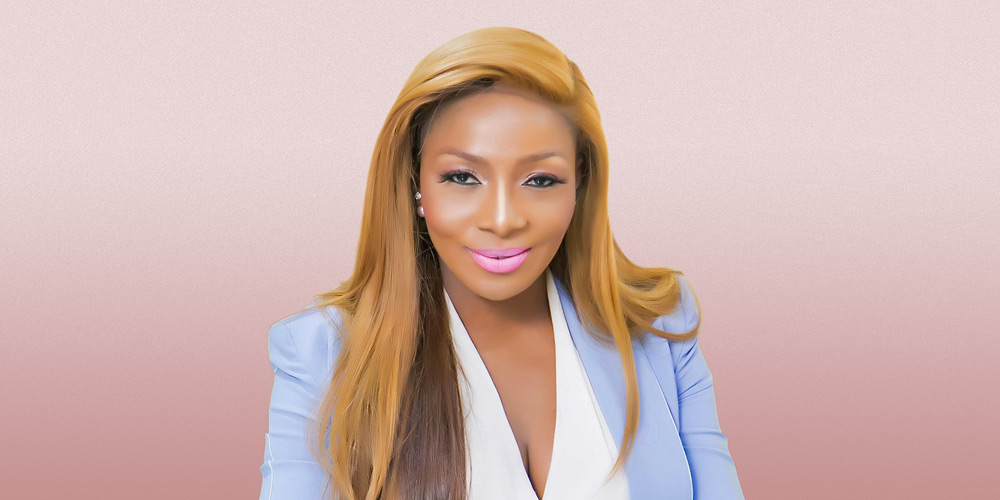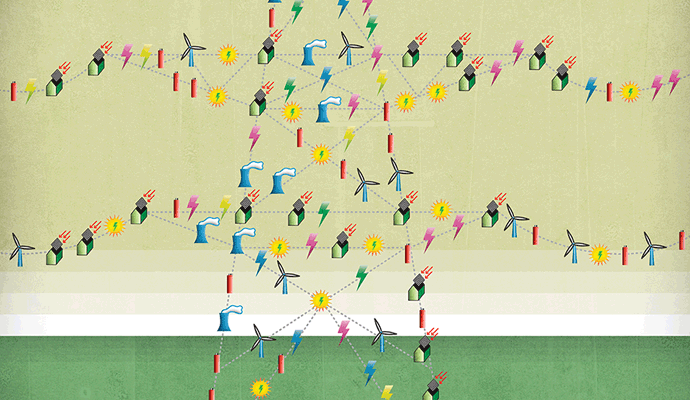The power broker
Chantelle Abdul grew Mojec International Holdings from a small family-owned business in Nigeria into an energy business that has helped modernize the country’s electricity market. Now, she’s thinking even bigger.
This interview is part of the Inside the Mind of the CxO series, which explores a wide range of critical decisions faced by chief executives around the world.
Where other people see problems, Chantelle Abdul sees opportunities. Abdul, who was born in Nigeria but grew up and was educated in the U.K. and U.S., is the CEO of Mojec International Holdings, a family-owned conglomerate based in Nigeria and West Africa with operating portfolio investments in power, energy, mining, technology, and agriculture.
When Nigeria’s power industry was first privatized in the 2010s, electric bills were rough estimates at best, with no clear link between customers’ usage in a given period and their bill. Not surprisingly, many people refused to pay. In that environment, there was little business value in simply generating more electricity, as those investments couldn’t be recouped. Abdul was among the first to realize that smart electricity metering was the critical link in successfully building out the country’s electricity grid.
Today, Mojec, which employs more than 2,000 people and had sales of US$40 million in 2018, has an annual installed production capacity of 1.2 million electric meters, and has a 70 percent share of the Nigerian market. It has also expanded beyond meter manufacturing to power generation, transmission, and distribution services, in addition to serving as an engineering, procurement, and contracting vendor for power utilities throughout Africa. From that foundation, Abdul has pushed to expand into new areas, including mining, real estate, and agriculture.
All of those varied business units could get a lift soon, in the form of the Africa Continental Free Trade Area (AfCFTA), an initiative spearheaded by the African Union to reduce trade barriers across the continent. More than 22 countries are signatories, and the undertaking has the ultimate goal of linking all 54 countries in Africa into a single economic zone.
Abdul talked with strategy+business before and after the outbreak of the COVID-19 pandemic about the potential opportunities of a continent-wide trade area, the lessons of globalization, and how she spotted opportunities in her home country that no one else saw.
S+B: Where do you see the global economy going over the next year?
ABDUL: In 2019, there was a market rally in the U.S. and a euphoric air due to the capital market gains that investors had been enjoying. There was a very positive outlook. But with the significant turn of events in 2019 and the first quarter of 2020 (with trade conflict between the U.S. and China), and the oil war between Russia and Saudi Arabia (with the U.S. being drawn in), as well as the advent of the COVID-19 pandemic, which has overturned the status quo in world markets and economies — I believe investors globally will tread with extreme caution.
How much do the trade war, oil war, and the COVID-19 pandemic affect Africa as a continental economy? And how will these affect Nigeria as the largest market in Africa? A few people may disagree, but I think there’ll be a significant impact to us. Nigeria’s economy is dependent on imports and derives 90 percent of its export earnings from crude oil trade, so it will be heavily impacted. The international embargos on import–export activities and trade/oil wars definitely will affect the cost of goods and the cost of living for a lot of people here for the foreseeable future. A significant number of Nigerian companies rely on China for the manufacturing of equipment and products. There will be an indirect effect as well, because a lot of China’s revenues come from its exports to the United States. If those revenues decrease through tariffs, then China will have to increase prices to maintain the economic status quo. The devaluation of currency due to the economic glut globally as well as the oil wars will lead to higher prices for local and international trade. So we’re going to see an increase in overall prices in Africa. Simply put, it’s the basic laws of supply and demand. We’re already seeing it in manufactured goods; now we’ll see an increase in the cost of raw materials as well.
S+B: Is there any upside to the trade dispute?
ABDUL: The global COVID-19 pandemic and the plummeting oil prices are more relevant than trade disputes in our world today.
S+B: What does that mean more specifically?
ABDUL: With the impending economic recession, the reset button will be activated. This is the right time for shrewd, savvy investors to enter the market and snap up acquisitions at bargain prices. Africa could finally utilize this opportunity to grow its economy — a position that it ought to have taken years ago because of an abundance of minerals, arable land, vegetation, and natural resources. The government is finally figuring that out, especially because of the COVID-19 pandemic. We need to become an industrial nation that produces goods and services consumed by its people. We must grow our businesses, empower our people, and then go after corporate individual taxes to raise revenues to reinvest in our own country. Let’s look at agriculture, locally made goods. I don’t think there’s any more appropriate time than now. If we had the vision and the foresight, we would invest now.
S+B: When some people look at doing business in Africa, all they see are challenges.
ABDUL: I never see problems as obstacles but simply as problems to be solved. Solving problems is par for the course in business. You’re supposed to wake up and fix something every day. In the early days after the electricity market in Nigeria was first privatized, in 2013, most Nigerians were in the dark. Mojec initially looked at power generation. But I realized even if [Mojec made] that investment it might not work, because the distribution companies were not effectively collecting revenues. People didn’t have meters — there was an 80 to 90 percent metering gap in the country. So, you might get a huge bill and think, “I don’t believe that, because I only got two hours of electricity that week. I’m not paying that bill.” So, you challenge that, or maybe you don’t remit your payments, or you pay [only] a part of [the bill].
Solving problems is par for the course in business. You’re supposed to wake up and fix something every day.”
As a company, we positioned ourselves to say, “Why don’t we fix this problem?” If a user knew how much she consumed — that this is her bill — she should pay the bill, which covers the cost of generating and distributing that electricity. Our model as a company is to make sure that we fix the distribution and the collection so that there is an investible proposition up the chain. Then you can justify an increase in electricity tariffs and of course an increase in generation, which we would all like to see. But it’s not only about more generation — it’s about better, more effective collection of payments.
S+B: How did you fend off foreign competition in this growing market for meters?
ABDUL: Every producer or manufacturer wanted to get in on this market. I met manufacturers out of Europe. Unknown to most people in Nigeria, there were at least three or four local producers. We were one of them, and we had to stake our claim. The Nigerian manufacturers had to get together and pressure the government to ensure that the right policy was put in place to protect local manufacturers. And as a result of that deliberate effort, we were able to get high tariffs placed on imported goods, because it was detrimental to the local economy and our society at large for us to import things we could produce locally. We didn’t get here by happenstance. We got here by intentional pressure on the powers that be and engaging the government.
S+B: How will Mojec maintain its market lead?
ABDUL: When I first moved back to Nigeria and joined Mojec, one of the things I started doing was positioning the brand internationally. We wanted to be known as a company that was trading in Africa, and not limited to Africa. The world is our market. For us, [high-specification] standards were everything. We could have brought in cheap components for our meters. We could have cut corners, but we didn't.
I was faced with that challenge. I like to say that we were trying to produce Mercedes-Benzes at a price that was affordable to the market at large. The product had to be durable, it had to be reliable, and it had to work. We’re focused on making sure that our product is the best in the market, period. We aligned the firm with global best practices and benchmarked against global firms that were manufacturing products in a similar sector. We made sure our people were trained internationally, through alliances with other companies. We have a world-class team of engineers who work with us and who also get trained abroad, and we get engineers from abroad who come to us for training. [Because of this approach], we are now able to create our own meter designs.
The key is doing the right thing. It may increase costs early on, but it pays off in the long run.
S+B: How are you capitalizing on technology?
ABDUL: We’re both a hardware and a software company, so we see huge opportunities in technology. We have an energy management platform that allows people to manage their energy usage from their phones. You’re able to not only check your meter, but also buy more power using tokens. We are working on a phone app that will launch shortly that enables you to read and control devices in your home.
We also have a green-energy company called Virtuits Solaris. Solaris installs solar panels and will help reduce the carbon footprints and subsequent pollution that so much of Africa suffers from because it brings a cleaner energy solution directly to people’s homes. We’re developing smart energy systems that allow customers to utilize [energy] from sources other than the grid, like the sun. So, when you’re not at home, your solar roof could be generating power for you to use when you come home.
S+B: Are there any downsides to technology in terms of your workforce?
ABDUL: For a continent like Africa, a country like Nigeria, we have to be a little bit careful of how we use technology. There’s a larger benefit to it, and there are human costs. For my production line, for example, I could have fully automated machines, and they would probably produce everything for me faster. But that affects jobs and how a company is supposed to be creating jobs. [When you are] a business owner or business leader, it’s a decision you must make often. You’ve got to train your people as much as you can to be able to handle these technologies, rather than just having the machines do all the learning. Also, with the advent of the COVID-19 pandemic, we have adopted critical infrastructure to ensure staff are online in real time in order to mitigate the impact of remote work to our business. This has been successful. Technology has its upsides and downsides, but we as a socially conscious company have decided to leverage more of its upsides.
S+B: Is the recently signed Africa Continental Free Trade Area (AfCFTA) a positive development?
ABDUL: Markets are based on size. It’s the simplest thing, and most people really don’t know it. America created a lot of its billionaires based on that fact. For example, Starbucks could open a store in New York and then go from New York to Boston, Boston to Washington, opening multiple stores across its own country. The same thing with China, with a billion people! Even if you have just 10 percent of that market, it’s millions of people; 1 percent of that market is still millions.
Europe was also able to create a lot of billionaires by virtue of forming the European Union. Why? A small European country with 3 million or 4 million people couldn’t fight against the United States, which had 140 million and was still growing. Forming that trading alliance was the wisest thing that Europeans could do.
S+B: It sounds like you’re in favor of AfCFTA?
ABDUL: Yes, I’m in favor of it. I think over the next few years we’re going to see a significant rise in African trade. Not necessarily in high tech or highly capital-intensive goods — more like basic commodities, agriculture, clothing. You’re going to see us begin to buy each other’s fashion and local goods. I don’t need to necessarily be carrying a Louis Vuitton bag; I could be carrying one from Liberia that was made with local material, so the leather didn’t need to be imported. When we begin to develop our own homegrown goods and trade those among ourselves, that is where the continent’s next set of millionaires and billionaires will be made.
We must learn the lessons that the European Union learned, and the lesson from globalization in general. Those companies that understood the benefits globalization conferred clearly took advantage of them. Because then you begin to see the rich get richer. You need agreed-on rules or you will get companies going into a smaller, poorer country, pillaging, and then exiting and taking the gains with them. Each nation really does have to have a policy. Either you come in, you invest, and you remain, or maybe you can only repatriate in tranches. But you can’t come in with [US]$10 million and leave with $100 million, because you’ll leave a hole in that local economy. To take advantage of the benefits that the free trade market would confer on us as African nations, we must learn the lessons of globalization.
S+B: Which countries do you think will drive growth in African trade?
ABDUL: I believe a lot of African nations were practicing and preparing themselves for all this when they were considered underdogs. Many of those that didn’t have the curse of oil, for example, have learned to diversify and focus on developing other sectors. Ghana is a big tourist attraction with its hospitality and tourism, like Dubai. You can’t ignore Ghana — despite its [small] size, it is well positioned and well structured.
Other countries have emerged from war and gotten their act together, like Ethiopia. [As have] Angola and Kenya, by virtue of their performance and even just their market size.
I also think you’ll begin to see other African countries coming into Nigeria and trying to take advantage of Nigeria’s market size as well. By 2030, Nigeria is expected to be the third-largest in world population.
S+B: Africa is a tough market. What is your advice to companies coming into this market?
ABDUL: Think global but act local. In other words, you have to do your due diligence, know what you’re looking for, and understand the market that you’re getting into. I would say don't take no for an answer because you absolutely should be pushing the envelope. And, perhaps to mix metaphors, you must think outside the box, because there is no box. You get to create your own box; you have to be ready to create your own infrastructure because you’re not going to have a ready pool of people waiting who have all the skill sets you need. You’re going to have to invest in training your human capital and making sure that you have top performers who will work with you. You have to make sure you’re investing in your infrastructure, and you may have to generate your own power.
S+B: What are your growth prospects over the next year and in the medium term?
ABDUL: There’s a reason our firm’s tagline is building a world of possibilities. On a continent where all you see is impossibilities, we’re building a world of possibilities, and these possibilities are immense because everywhere you look, there’s a problem to be solved. Even today, about 55 percent of Nigerians are off the grid, and the 45 percent who are on the grid have only intermittent power.
Once we have contributed significantly to solving the power-sector challenges, we can begin to develop as a nation and build the Africa of our dreams. We can then expand and develop other sectors. I think the pleasure of life and the pleasure of being an entrepreneur is being able to solve problems, and it’s from solving the problems around you that wealth is created. For us, there are so many problems to solve. In this decade, watch out for Africa’s unicorns.
Author profile:
- Abimbola Banjo is associate director in the finance advisory practice with PwC Nigeria. He is based in Lagos.





